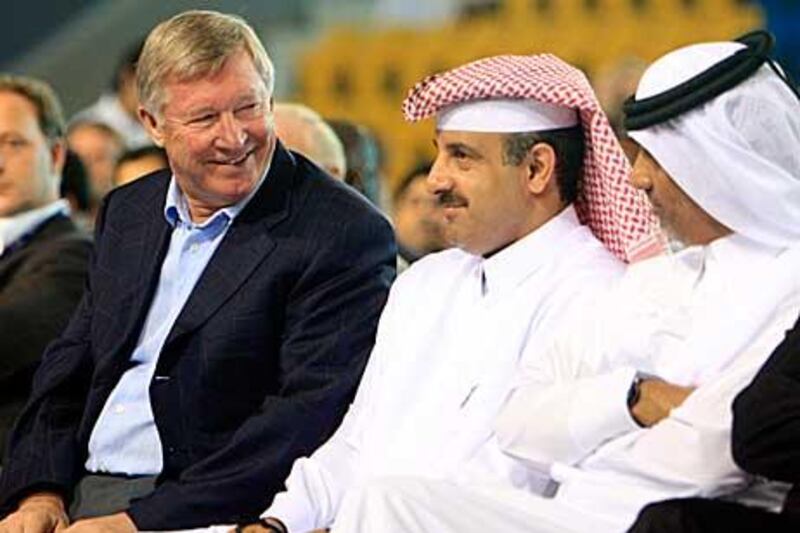As Qatar aims to widen the frontiers of where football might go, a giant of the game turned up in Doha to contemplate in vivid detail where it has been.
Sir Alex Ferguson spoke loquaciously of his first 36 managerial years on Wednesday at the Aspire4Sport conference, and it became the kind of brisk hour that makes you wish it were two hours or four hours or even eight hours so long as somebody brought in food supply.
Pretty soon a rapt and full audience had visited a smoky room in 1974 for a peek at football's past when a fading 32-year-old striker with Ayr United in Scotland interviewed for a managerial job with East Stirlingshire.
"Wonderful chairman," Ferguson said. "Chain smoker. I asked him how many players he had under contract, and his puffing started to go quicker."
The chairman said he would get that number for Ferguson, but days passed before he did. "Turned out he had eight players and no goalkeeper," Ferguson said. "I said, 'It's very advisable to start the game with a goalkeeper. It's a very good idea.'"
Agreeing, the club dipped into its coffers and dug out £2,000 (Dh11,600) so that Ferguson could purchase five players, the first of whom he signed for £100.
From there, of course, Ferguson has flung himself forward into an entirely different universe, one accentuated by stratospheric player commerce and breakneck sackings of managers, the kind of atmosphere that might have sideswiped him during his rocky, early years at Manchester United in the late 1980s and prevented his 11 league and two European Champions League titles.
To describe that contrast, he told of a photograph in a book showing Manchester United and Leeds United players having a brawl. The audience, he noted, observes the kerfuffle placidly, absent the screaming it would elicit today.
"Behavioural patterns are completely different from 30 or 40 years ago," he said, suggesting that those patterns have lent pressure that has reached into the boardrooms.
"Changing managers doesn't guarantee success, but longevity in my case, in Brian Clough's case, in Arsene Wenger's case, has proven successful," he said.
"You wonder whether the directors sitting around their tables at the club with their port and their cheese and all that, whether they consider Brian Clough, Alex Ferguson …"
He has lasted long enough, then, to encounter "a more fragile human being that I'm dealing with today than 20 years ago," he said, describing the players as "cocooned" by "modern life", by "parents", by "agents", by "their own image".
He used the inevitable words "tattoos and earrings."
He marvelled at a recent story of a player crying after an upbraiding and said, "Think of the players I've had! The Robsons, the Hugheses, crying! They'd bite your head off!
"And I have had to change myself to adapt to them," he said. "And I've changed."
When he censures a player, he said, his assistants often remind the player of the greater vehemence of yore with a reassurance such as, "You should have heard him 20 years ago".
Yet now, he said, he revels in the multi-national rosters of his squads, marvelling at how they actually communicate and at how it has expanded his managerial worries.
"For instance," he said, "we have issues with the Brazilians, because they eat late … Oh, it's a nightmare … They don't go to bed until 1am. It's their culture and we tell them, 'You have to be at training at 9am'."
He has also lurched clear into an era when even a team across town might go on a buying spree that ratchets up a cross-town rivalry, as has happened with the Abu Dhabi-owned Manchester City.
"Well, you can buy success if the structure's right," he said.
"And they've bought some good players, no question about it. But once again there's this time thing, and how you build it." Making it mesh, he said, would seem a larger hurdle than managing egos. "I don't think there's anything wrong with people with egos," he said.
"People with egos have to win. Straightforward. We had players with big egos like Eric Cantona. He had to win to feed that ego … So I have no problem with that at all."
If that sounded like a 21st-century manager dwelling in realism, it also reminded that Ferguson has proved au courant in both centuries and lacks any plan to cease remaining so.
"Retirement's for young people, not for older people," he said. "Because young people can do something else. If I get off this treadmill, where do you think I'm going? Down there?"
He pointed to the ground.
"Trust me. Retirement's for young people."





